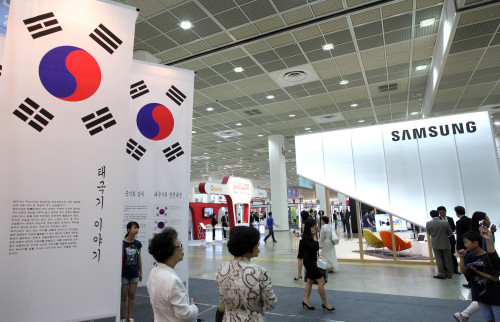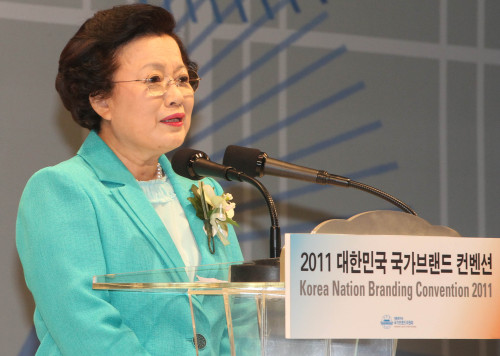Inconsistent projects on nation branding may hinder promotion of hallyu and other successful events
The Lee Myung-bak administration has repeatedly stressed its desire to improve the Korea brand.
It became the first country to establish a presidential council on the issue, to coordinate and support efforts to bolster the nation’s image.
But the council admits it isn’t even aware of all nation branding projects, and its chairman’s primary aim of replacing the “Dynamic Korea” slogan remains undone.
The Lee Myung-bak administration has repeatedly stressed its desire to improve the Korea brand.
It became the first country to establish a presidential council on the issue, to coordinate and support efforts to bolster the nation’s image.
But the council admits it isn’t even aware of all nation branding projects, and its chairman’s primary aim of replacing the “Dynamic Korea” slogan remains undone.

To bolster the credibility of Korea and its products the council set up the Korea Nation Branding Convention from Aug. 25-28 at COEX in Samseong-dong, Seoul.
But how much of a boost it brought is questionable. Organizers expected 200,000 people to attend, but only about 120,000 turned up.
Organized by the Presidential Council on Nation Branding, the event aimed to discuss hallyu, the spread of Korean pop culture overseas, with international scholars. It was also designed to remind Koreans of their potential by shedding new light on traditional culture and relics; success stories of representative companies; and products developed by local governments.
“Shortcomings as well as good points were found as this was the first time. Modeling it upon this year’s results, next year’s convention will be better,” said a PR official of the convention. The event is planned to be held annually.
The council isn’t the only one coming up with ideas to brand the nation. Other government organizations are joining in the effort, but they aren’t properly coordinated, and some doubt if government-led projects are the best way to achieve these aims.
Reliable index?
Several indexes measure and rank countries’ brands, but the results have been disappointing for Korea. Thinking these indexes had underrated Korea’s brand, the branding council took a direct solution: It developed its own index.
Soon after its establishment in 2009, PCNB developed the National Brand Dual Octagon, a brand value index with an ironically complicated name, with Samsung Economic Research Institute, to study the “actual” value of Korea among 50 countries. According to this index, Korea ranked 19th in 2009 and 18th in 2010.
But even the council’s leader is not convinced of the index’s perceived credibility.
Lee Bae-yong, chairman of the Presidential Council on National Branding, pointed out that the thought that NBDO would be less credible compared to foreign indexes is the very kind of mindset she hoped to fix through the convention.
“Anholt’s Nation Brand Index is not officially recognized around the world either. What is important is that we made the index objectively and fairly to assess what we actually have. Like any other indexes, we put in great efforts to have it universally used,” said Lee.
The results of the NBDO differ from those of other international indexes. In 2010, for example, Korea ranked 23rd in the IMD World Competitiveness Scoreboard; 22nd in the Global Competitiveness Index issued by the World Economic Forum; and 44th in FutureBrand’s Country Brand Index. The PCNB left out in its 2010 report.
“Results easily fluctuate according to the categories the index covers. CBI focuses on tourists’ opinions so it is important that many have visited the country. Korea was ranked low because many Europeans are still not aware of the country, and I believe that was why CBI was excluded from the comparative list in the 2010 report,” said Kim Pan-jun, director of the Presidential Council on Nation Branding’s Bureau of Planning and Coordination.
But awareness is an important part of the branding project. The PCNB’s website states that “The most important mission of the PCNB is to inform the world about Korea.” At the same time, it rejects a measure of its success because of its reliance on awareness.

Unfocused projects
The PCNB is designed to deliberate and manage nation branding projects conducted by separate ministries to prevent overlap or budget misuse and maximize efficiency.
But the PCNB admits it doesn’t even know what all these projects are. It is not mandatory to pass such projects to the PCNB, or even inform the council of them, and ministries conduct projects on their own as well.
The National Theater of Korea’s Nation Brand performances are one example.
The National Theater of Korea produced five “Nation Brand” performances from 2006 to 2008, funding them with 1.4 billion won ($1,293,000) from The Ministry of Culture, Sports and Tourism. The shows include The National Dance Company of Korea’s “Dance, Chunhyang” and The National Changgeuk Company of Korea’s show “Cheong.” This year, NTOK spent another 1.4 billion won on a single Nation Brand show, the new musical “Kim Hong-do.”
The shows were given the weighty title of “Nation Brand” even before the content was finalized. NTOK did not announce specific plans on how the musical will live up to its name or how it would promote Korean traditional culture to the world. “Kim Hong-do” does not have any plans for overseas performances, NTOK officials said.
The PCNB is not even aware of some branding projects.
“Unless projects are assigned to us, it is possible that we don’t know about them. We have 42 staff members. We cannot run around checking everything,” said Lee.
“Right now the council operates under a presidential decree, but it should make its own legal basis in the future so that when it deliberates a project and allows the use of the council’s name, it can have legal binding force. We should systematize the accreditation process,” she added.
To make things more complicated, there is a completely different award but of a similar concept, called National Brand Award, organized by a private company. A PCNB official said that there is no legal basis to stop the awards or suggest reorganizing roles.
David Aaker, professor emeritus at the Haas School of Business of the University of California, Berkeley, said the question is whether the PCNB would be effective or not.
“There are many countries that have been successful without such councils. But it (PCNB) certainly has potential to do that with all those high-level experts together. If they can make task forces and focus on the opportunities, it could be really good. But it’s not a sure thing. It is going to be a challenge,” he said.
Support or interference?
Many urgent tasks in enhancing the image of Korea, like fixing errors in English-language signs and cultural heritage site brochures, are being put off by local governments due to budget constraints. The slogan “Dynamic Korea,” created in 2002, remains unchanged although Lee Bae-yong stated as her primary task the renewal of the slogan during an interview with The Korea Herald soon after her inauguration last year.
But when it comes to issues such as K-pop and hallyu, governmental organizations are in a state of hubris. KBS2, a state-run broadcaster, hosted a K-pop concert in Tokyo in July, and is planning on holding more in New York in October, China in November, and Vietnam and Europe next year. The Culture Ministry is planning to form a new pop culture team to handle hallyu issues.
Lee Soo-man, chairman of SM Entertainment, asserted that independent hallyu is better than state-led hallyu events.
“The government’s hard work is creating synergy effects but I am worried that some of the state-run K-pop concerts or other projects under the name Korea may be not be so well organized, and eventually give a poor impression of hallyu. Hallyu has been and should be led by private companies and I hope the government would play the role of a supporter,” said Lee, during a talk with Culture Minister Choung Byoung-gug after receiving a plaque of appreciation from the Culture Ministry on July 27 for accelerating the Korean Wave.
Aaker voiced a similar opinion.
“The government shouldn’t take over. It should support and leverage. Make suggestions,” he advised, giving an example about how the U.S. revitalized country music.
“Country music became popular in the States, so they institutionalized it. So that it does not end up as a fad. The government could encourage the industry to do something like that. Create a facility or a Korean Wave annual award.”
Explaining that nation branding is in fact a worldwide trend which started about 15 years ago, Aaker said that Singapore, which has been creating a host of new things, such Universal Studios Theme Park, Mandela Bay, casinos, resorts and night safaris, has been doing a really good job.
“The thing about Singapore is that the emphasis is not on communication but on substance,” he said.
Aaker mentioned the success of Samsung and Hyundai; hosting of the Olympics and World Knowledge Forums; the Korea Day events held in the U.S.; and the Korean Wave as strong points of Korea.
“The role of the government in nation branding is to be opportunistic. Be on the look out for the things that might be effective. I think Korean council and companies can do what they can do to support them. Make them even more important,” he said.
By Park Min-young (claire@heraldcorp.com)








![[Kim Seong-kon] Democracy and the future of South Korea](http://res.heraldm.com/phpwas/restmb_idxmake.php?idx=644&simg=/content/image/2024/04/16/20240416050802_0.jpg&u=)







![[KH Explains] Hyundai's full hybrid edge to pay off amid slow transition to pure EVs](http://res.heraldm.com/phpwas/restmb_idxmake.php?idx=652&simg=/content/image/2024/04/18/20240418050645_0.jpg&u=20240418181020)

![[Today’s K-pop] Zico drops snippet of collaboration with Jennie](http://res.heraldm.com/phpwas/restmb_idxmake.php?idx=642&simg=/content/image/2024/04/18/20240418050702_0.jpg&u=)